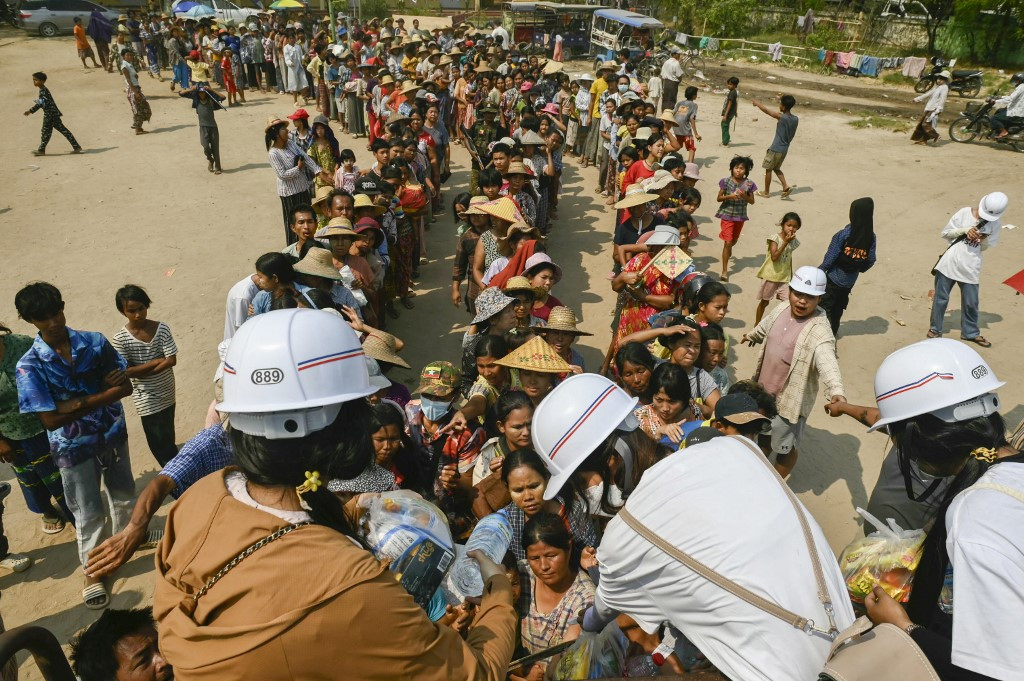Popular Reads
Top Results
Can't find what you're looking for?
View all search resultsPopular Reads
Top Results
Can't find what you're looking for?
View all search resultsMyanmar quake's call
ASEAN should work with international organizations in assisting Myanmar and facilitating a new dialogue between the Myanmar junta and various ethnic groups to promote peace and stability.
Change text size
Gift Premium Articles
to Anyone
T
he March 28 earthquake that struck Myanmar, which has killed thousands and destroyed infrastructure across the country, presents a moment of opportunity for a nation ravaged by years of internal strife.
More than 10 days after the disaster, many people in the war-torn country are still without shelter, either forced to sleep outdoors because their homes were destroyed or wary of further collapses.
The United Nations estimates that more than 3 million people may have been affected by the 7.7-magnitude quake, compounding previous challenges caused by four years of civil war.
As news of devastating destruction and displacement spread, the international community, including Indonesia, responded with humanitarian aid. A total of 143 tonnes of supplies, including food and medical equipment from Indonesia, arrived in Naypyidaw on Thursday.
In the wake of this tragedy, learning from our past experience, a question arises: Could this natural disaster catalyze an end to the war in Myanmar the way the Dec, 26, 2004, earthquake and tsunami led to a conclusion of decades-long conflict in Aceh?
While it is disheartening that such calamities often pave the way for peace, the aftermath of natural disasters has shown that they possess an extraordinary power to alter the course of conflict.
Cyclone Nargis, which struck the coast of Myanmar near the city of Yangon and swept across the Irrawaddy River valley on May 2, 2008, led to foreign intervention and pressure.
Aid and relief workers sent by international organizations were initially barred by the junta government from entering the country. Access was eventually obtained after then-UN secretary-general Ban Ki-moon and ASEAN negotiated an agreement with the military junta to allow the provision of humanitarian assistance.
Two years later, Myanmar’s 2010 elections, albeit controversial, marked a slow shift toward democratic reforms. The February 2021 coup, when armed forces wrested power from the civilian government of Aung San Suu Kyi, however, was a regression in this transformation. The military junta has ruled Myanmar since, sparking a multi-sided conflict.
The Aceh earthquake and tsunami, one of the largest natural disasters in recorded history, accelerated the peace talks between the Free Aceh Movement (GAM) and the Indonesian government, which resulted in a historic agreement signed in Helsinki on Aug. 15, 2005. Now, nearly 20 years later, the peace agreement is alive and well and seems to be here to stay.
The recent earthquake could provide a similar opportunity in Myanmar.
Junta chief Min Aung Hlaing issued a rare appeal for international aid following the disaster, indicating the severity of the crisis. The death toll from the major earthquake has risen above 3,300, the state media said on Saturday.
Previously, the military regime in the country shunned foreign assistance even after major natural disasters.
The involvement of humanitarian organizations on the ground could bring greater visibility to the situation in Myanmar, potentially pressuring the military government. Such pressure could help pave the way for a broader political dialogue, where all parties are given a seat at the table.
In this regard, ASEAN should work with international organizations in assisting Myanmar and facilitating a new dialogue between the Myanmar junta and various ethnic groups to promote peace and stability.
However, the international community must remain vigilant and insist on transparency and accountability in the humanitarian response. The world should not let the junta take advantage of the humanitarian pause to consolidate power at the expense of the people.
The UN says the junta has carried out dozens of attacks on its own people since the quake, including more than 16 air strikes since the military joined rebel groups in declaring a ceasefire to allow aid to get through.
The earthquake’s toll is tragic, but it could be a turning point in Myanmar’s ongoing crisis. The international community, especially ASEAN, must help Myanmar seize this opportunity to push for change and work toward a lasting peace in the country.











